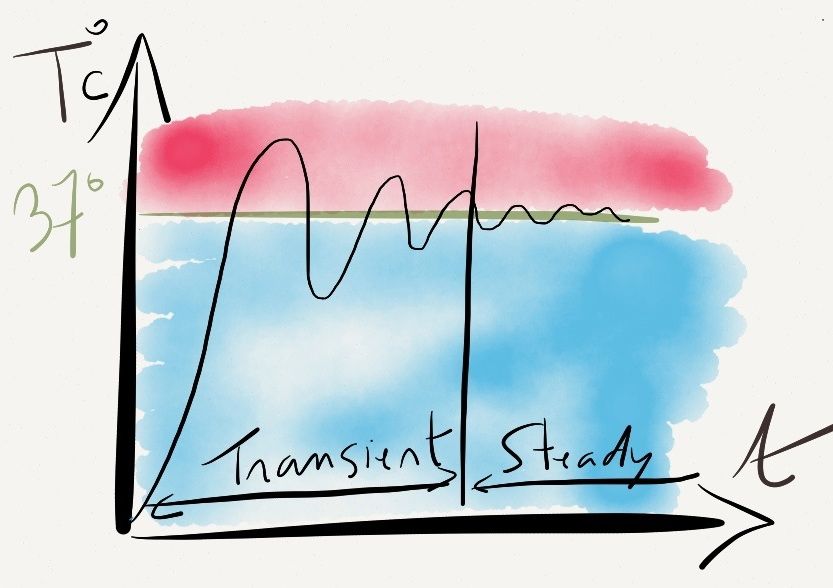you are wondering what is the relation between a Showerhead and FEA Analysis ?
The form of the oscillation depends mainly on the system which is behind that. Here you can think that the determinant factor to get quickly the temperature you want is the speed of your water boiler and your water installation (but I am not a specialist in that…).
If you have done some automation, you may also see in all that the regulation process of your system through integrators, derivators, etc… but this is another story… I have to keep something left ;-)
Transient analysis is not only valid for temperature, but also for any kind of mechanical event. You can think of a shock or an impact for example. When an object is touching the ground, it is submitted to a material wave of energy, which may destroy it (or not). Pretty cool, huh ?
Now you can go back to the dictionary’s definition and see if it makes sense now (I hope it will ;-) )
In FEA Analysis, Transient Analysis is to put inside the dynamic type of Analysis. because it is an event depending on time (obviously).
You have Direct Transient Analysis, Modal Analysis, Explicit Transient Analysis (the funniest type ;-) )
Continue to follow me to understand more about all these analyses :-)


Could you give us more details about the Direct Transient Analysis, Modal Analysis, Explicit Transient Analysis?, please…I am your fan!
Good to know I have some fans reading my posts ! Hope it can be useful to you.
I plan to make some posts on other topics as well ;-)
For the time being, you can here in the webinar section and you will find nice videos about all the topics which interest you (Hopefully): http://support.midasnfx.com/video_center.asp
Amazing example sir.
You’re welcome Sairam :)
dear sir,
your article are quite amazing and simple to understand with your day today life examples.
i have a doubt in my modal analysis how can i share with you sir.
Hi Abiram, What kind of doubts do you have about modal? Did you read the article I have about it: What is Modal Analysis?
Sir can u pls share details about sol129.I want to solve a nonlinear time dependent forces problem,is it ok to solve it with sol129 or sol400.
Hello Cyprien, I have a query regarding transient thermal analysis. We have two scenerios here:
1. Need to know temperature of the system after some time, say 30 minutes, however thermal constants such as K(thermal conductivity), Convection coefficients are NOT changing with the temperature at all
2. Thermal coefficients are changing with the temperature and we need to find temperature of the system after 30 minutes and also in another case Thermal coefficients are changing with the time and just want to know max temperature
Kindly clarify which kind of analysis should we do (steady state/transient thermal) in both the scenerios and would like to know why?
PS: Working as FEA engineer, recently started to work in thermal simulations.
Thanks for the practical posts, we are watching you :-)
Hi Vaibhav,
I think it depends on your system. If you think that 30 min is long enough to reach a steady-state temperature (temperature is not changing after) and you are interested only in the final temperature then a steady-state thermal simulation should be enough.
Now, if your problem is to observe the change of temperature from the very beginning to know what happens to the temperature inside your model at every step and determine precisely when you will reach the steady state in your part (equilibrium of temperatures), then you should perform a transient thermal study.
From my knowledge, the fact that thermal coefficients depend or do not depend on temperature do not influence the choice between steady state study of transient study. Only if your coefficients depend also on time…then it would.
Hope it helps. Thank you for following the blog!
Cyprien